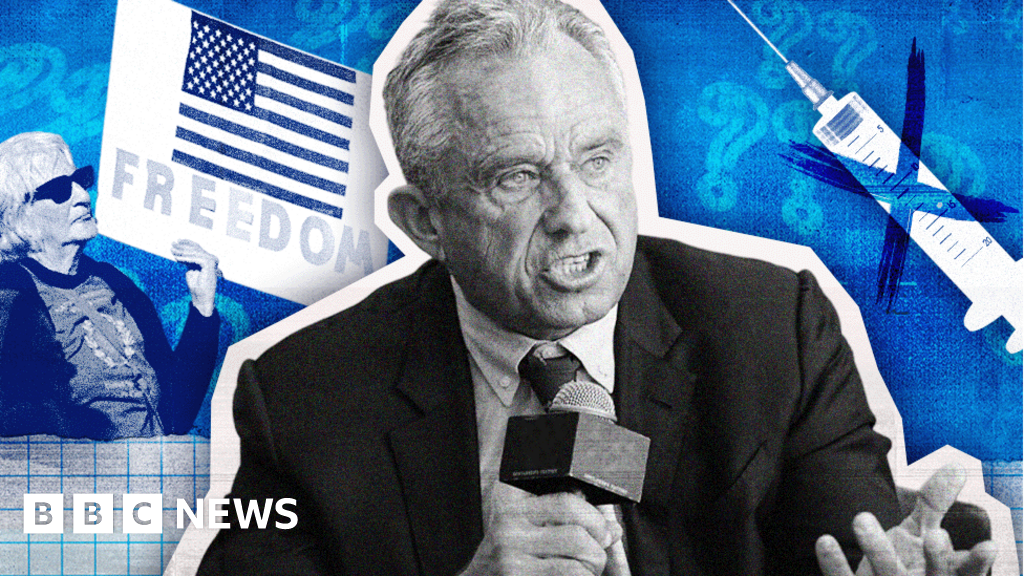The Cost of Vaccines: Accessibility and Affordability

Introduction
The ongoing U.S. measles outbreak has been a cause of concern for many parents, especially those with young children. One such parent is a man from Texas, who recently took his son to get vaccinated against the measles. However, the cost of the vaccine was a staggering $1,400, which has raised questions about the accessibility and affordability of vaccinations.
Background
The U.S. Food and Drug Administration (FDA) has been at the forefront of regulating and approving vaccines in the country. In light of the COVID-19 pandemic, the FDA recently announced plans to limit the approval of updated coronavirus vaccines to older adults and people with pre-existing medical conditions. This move has sparked debates about the prioritization of certain groups for vaccination.
In a similar decision, the U.S. Health and Human Services Secretary, Robert F. Kennedy Jr., recently replaced the entire CDC vaccine advisory panel, appointing new members to the committee. This move has been met with mixed reactions, with some questioning the reasoning behind such a drastic change.
On the other hand, the FDA has also expanded the approval of Moderna's respiratory syncytial virus (RSV) vaccine to include adults under the age of 60 who are at a higher risk of the disease. This decision has been welcomed by many, as it provides a much-needed option for those at risk of RSV.
Current Scenario
The U.S. measles outbreak has led to a renewed focus on the importance of vaccinations and the potential consequences of not getting vaccinated. However, the high cost of the measles vaccine, as seen in the case of the Texas man, highlights the issue of accessibility and affordability. With the cost of healthcare rising, many families may struggle to afford essential vaccines for their children.
On the other hand, the FDA's decision to limit the approval of updated COVID-19 vaccines to certain groups has sparked debates about the prioritization of vaccination. This has also raised concerns about the potential impact on herd immunity, which is crucial in preventing the spread of diseases like measles and COVID-19.
Overall, the U.S. healthcare system is facing challenges in providing accessible and affordable vaccinations for all, while also ensuring a fair and effective distribution of vaccines. As the country continues to battle the ongoing measles outbreak and the COVID-19 pandemic, it is essential for the government and healthcare bodies to address these issues and find solutions that benefit the entire population.
About the People Mentioned
Robert F. Kennedy Jr.
Robert F. Kennedy Jr. is an American politician, environmental lawyer, and author, born on January 17, 1954, in Washington, D.C. He is the third of eleven children of Robert F. Kennedy, the U.S. Attorney General, and Ethel Skakel Kennedy. His family's political legacy includes his uncle, President John F. Kennedy. Kennedy's early life was marked by personal struggles, including drug addiction, which led to his arrest for heroin possession in 1983. However, he later redirected his life towards environmental advocacy and public service. Kennedy graduated from Harvard University in 1976 with a degree in American history and literature and later earned a law degree from the University of Virginia in 1981. He began his career as an assistant district attorney in Manhattan but soon shifted his focus to environmental law. In 1987, he received a master's degree in environmental law from Pace University, where he taught environmental law from 1986 to 2018 and co-founded the Environmental Litigation Clinic. Notably, Kennedy is the founder of the Waterkeeper Alliance, a global clean water advocacy group, and Children's Health Defense, which focuses on childhood chronic diseases and environmental exposures. He has been recognized for his environmental activism, including being named TIME Magazine's "Hero for the Planet" for his efforts in restoring the Hudson River. Kennedy has also been involved in high-profile legal cases against companies like DuPont and Monsanto. In recent years, he has been a vocal figure in vaccine skepticism and public health controversies. In the 2024 U.S. presidential election, Kennedy initially ran as an independent candidate before endorsing Donald Trump. Currently, his involvement in public life includes controversial stances on health and environmental issues. Despite these controversies, his work in environmental law and advocacy has had significant impacts on public health and environmental protection.
About the Organizations Mentioned
U.S. Food and Drug Administration
The **U.S. Food and Drug Administration (FDA)** is a federal agency responsible for protecting public health by regulating food, drugs, medical devices, cosmetics, tobacco, and veterinary products in the United States. Its core mission is to ensure the safety, efficacy, and security of these products through rigorous oversight, scientific evaluation, and enforcement of federal laws, notably the Federal Food, Drug, and Cosmetic Act (FD&C Act) signed into law in 1938[2][5][9]. The FDA's history dates back to the early 20th century with the 1906 Pure Food and Drugs Act, but its modern regulatory authority was significantly shaped by the 1938 FD&C Act, which required pre-market safety review of drugs and banned false therapeutic claims[2][5]. Key legislative milestones include the 1951 Durham-Humphrey Amendment, which defined prescription drugs, and the landmark 1962 Kefauver-Harris Amendments that mandated proof of both safety and efficacy before drugs could be marketed, marking the start of the FDA's modern drug approval process[2][6]. The agency's role expanded over time to include regulation of cosmetics, medical devices, biological products, and tobacco[5]. The 1997 FDA Modernization Act further refined regulations, improving patient access to experimental treatments and speeding review processes[3]. Notable achievements include preventing the approval of thalidomide in the U.S., which averted widespread birth defects seen elsewhere, and establishing stringent drug approval standards that make the U.S. regulatory system one of the toughest globally[2][6]. The FDA also enforces labeling laws for consumer products and has pioneered initiatives such as the Office of Prescription Drug Promotion to ensure truthful drug advertising[3]. Today, the FDA remains a critical player at the intersection of business, science, and technology, balancing innovation with public safety. It faces ongoing challenges from emerging technologies, complex product innovations, and global supply chains but continues to adapt its regulatory framework t
U.S. Health and Human Services
## Overview of the U.S. Department of Health and Human Services (HHS) The U.S. Department of Health and Human Services (HHS) is a cabinet-level executive branch department responsible for protecting the health of all Americans and providing essential human services, especially for those most in need[2][4]. Established in 1953 as the Department of Health, Education, and Welfare (HEW), it was reorganized in 1979–1980 into HHS after the creation of a separate Department of Education[1][4]. Today, HHS is the principal agency for health policy and services in the United States, representing nearly a quarter of all federal outlays and administering more grant dollars than any other federal agency[2][5]. ## Core Functions and Programs HHS oversees a vast array of programs that touch virtually every American’s life. It manages Medicare and Medicaid, the nation’s largest health insurance programs, which together cover about one in four Americans[1][2]. The department also runs the Children’s Health Insurance Program (CHIP), supports health insurance exchanges under the Affordable Care Act, and provides health services for Native Americans[2]. HHS is responsible for food and drug safety through the FDA, disease prevention and control via the CDC, and advances biomedical research through the National Institutes of Health (NIH)[1][3]. Other areas include maternal and child health, substance abuse and mental health services, early childhood development, services for older Americans, and programs to prevent child abuse and domestic violence[2]. ## History and Key Achievements HHS traces its roots to the early 20th century, evolving through several reorganizations to focus on health and human services. One of its most significant achievements is the establishment and expansion of Medicare and Medicaid, which have provided health coverage to millions of elderly, disabled, and low-income Americans since the 1960s[1]. The department has also played a central role in responding to public health emergencies
Centers for Disease Control and Prevention
The Centers for Disease Control and Prevention (CDC) is a premier U.S. public health agency established on July 1, 1946, originally as the Communicable Disease Center. It evolved from the wartime Malaria Control in War Areas program (MCWA) created during World War II to combat malaria around military bases in the southern United States[1][3][7]. Headquartered in Atlanta, Georgia, the CDC has grown from a regional malaria control unit to a comprehensive national and global health protection agency. The CDC’s mission is to protect public health and safety through disease control and prevention, health promotion, and emergency preparedness. It investigates and responds to emerging health threats such as infectious diseases—including COVID-19, influenza, and bioterrorism agents—as well as chronic diseases, injuries, workplace hazards, environmental health threats, and more[2][6]. The agency conducts scientific research via over 200 specialized laboratories nationwide, supports public health workforce development, and communicates critical health information to the public[6][5]. Throughout its history, the CDC has expanded its scope and structure significantly. It was renamed the Center for Disease Control in 1970, then the Centers for Disease Control in 1980 as it incorporated multiple centers, and finally adopted the current name, Centers for Disease Control and Prevention, in 1992 to emphasize prevention efforts while retaining the CDC acronym for recognition[2][8]. Its organizational breadth now includes centers focused on infectious diseases, chronic diseases, environmental health, injury prevention, occupational safety, and health statistics. Notable achievements include leading vaccination campaigns against diseases like measles and rubella, advancing injury prevention, and mounting global efforts against infectious outbreaks. The CDC also played a pivotal role in combating antibiotic misuse and bioterrorism preparedness. Despite past controversies like the Tuskegee syphilis study, the agency remains a leader in epidemiology and public health innovation, employing a multidisciplinary workforce of scientists, clinicians, and public health experts dedicated t
Moderna
Moderna is a biotechnology company pioneering messenger RNA (mRNA) technology to develop innovative medicines and vaccines. Founded in 2010 and headquartered in Cambridge, Massachusetts, Moderna gained global prominence for its rapid development of a highly effective COVID-19 vaccine, which became a cornerstone in combating the pandemic. The company’s platform leverages mRNA to instruct cells to produce proteins that trigger immune responses or treat diseases, positioning it at the forefront of next-generation therapeutics. Moderna's history is marked by rapid growth and innovation, but also recent financial and strategic challenges. After peaking in market valuation in 2021 at about $185 billion, Moderna’s market value has since dropped sharply by over 90%, reflecting the decline in demand for COVID vaccines as the pandemic wanes. In Q2 2025, revenues dropped by 38% year-over-year to $0.1 billion, driven primarily by reduced vaccine sales, mostly in the U.S. market which accounts for 80% of sales. Despite this, the company reported a strong cash position of $7.5 billion and plans to improve operational efficiency through cost reductions and workforce adjustments[1][2]. Beyond COVID vaccines, Moderna is advancing a diverse pipeline with 45 development programs and 36 ongoing clinical trials, including promising cancer vaccines that have attracted significant attention for their potential to revolutionize oncology. The company emphasizes its commitment to scientific innovation and patient impact through mRNA medicine, maintaining a strong culture of research and development while navigating a post-pandemic landscape[3][4]. Moderna remains a major player in biotech, balancing the legacy of its pandemic success with efforts to diversify its portfolio and sustain growth amid evolving market conditions. Its journey highlights both the transformative power and volatility of cutting-edge biotech innovation in the global health arena[2][3][4].

















